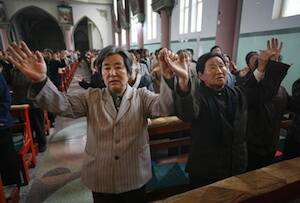Zhang Qingli, the Communist Party official who was in charge of Tibet during the crackdown on Buddhist protesters in 2008, is now the new party chief in China’s Hebei Province. Hebei, which surrounds Beijing, is a stronghold of Catholic communities that have not registered with the government. Scott Flipse, deputy director at the U.S. Commission on International Religious Freedom and the organization’s China specialist, said predicting what Zhang’s appointment would mean for the Catholic Church is like “reading tea leaves.” But Qingli, he said, is “known for his persecution of religious communities and his attempts to curtail foreign influence,” and “his experience is such that it doesn’t necessarily portend well for Vatican-Beijing relations.” These relations worsened in recent months after China ordained bishops without Vatican approval and the church announced the bishops were automatically excommunicated. China also has increased pressure on unregistered Catholics.
Hardliner in Hebei?
Show Comments (
)
Comments are automatically closed two weeks after an article's initial publication. See our comments policy for more.
The latest from america
At a Mass for the Jubilee of Youth outside Rome, Pope Leo exhorted over a million young people to be "seeds of hope" and a "sign that a different world is possible."
Perhaps it is the hard-won wisdom that comes with age, but the Catholic rituals and practices I once scorned are the same rituals and practices that now usher me into God's presence, time and time again.
"Only through patient and inclusive dialogue" can "a just and lasting conflict resolution can be achieved" in the long-running conflict between Israelis and Palestinians, said the Holy See's permanent observer to the United Nations.
The ”Bad Guys” films ask, how do we determine who the “bad guys” are? And if you’re marked as “bad” from the start, can you ever make good?








